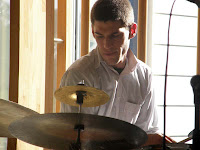 Right from the first notes, we knew these were special players, although it was hard to catch the intimate performance over a very noisy venue. Kristin Berardi was playing a duo with guitarist James Sherlock. Trinity is a lively acoustic space, so talk carries, but this was a particularly intrusive night, with a birthday group and a newly minted 18-year-old girl having a good time. That’s fun and OK but it was certainly a battle for this performance. Kristin took it with good humour, and the second set was better after the partygoers had mostly left and the PA was tuned. Oh, the travails of live performance in bars.
Right from the first notes, we knew these were special players, although it was hard to catch the intimate performance over a very noisy venue. Kristin Berardi was playing a duo with guitarist James Sherlock. Trinity is a lively acoustic space, so talk carries, but this was a particularly intrusive night, with a birthday group and a newly minted 18-year-old girl having a good time. That’s fun and OK but it was certainly a battle for this performance. Kristin took it with good humour, and the second set was better after the partygoers had mostly left and the PA was tuned. Oh, the travails of live performance in bars.



 But they were such satisfying performers! Kristin is an international award winning singer, and it showed. My concentration was not so much on the quality of her voice, but on her incredible fluidity and mobility and inventiveness. This voice was vibrant and alive with athletic vigour, bouncing up and down the vocal range. Not so much smooth as vivacious and clever and joyous, and comfortable in counterpoint. James was similarly impressive. He’s having a bad run in Canberra: last week with WECC and a dismally small audience; this night with a decently sized audience but very noisy environment. Again, it was wonderful playing: a relaxed style; reliable and comfortable rhythms; sweet and varied chordal accompaniment; deliciously clear solo statements; an earthy, wooden tone. And the tunes were also intimate, especially several originals: one dedicated to her toddler son, others of loves lost and gained. I felt we were let in on some very personal histories: it was certainly honest. On the other hand, there was a humourous tune with a chorus of Yippee-ay-oh and mentions of V8s, and some standards and a few lovely 60s pop songs: I’ve grown accustomed to his face, and God only knows (I don’t know what I’d do without you), which I was surprised to learn was a Beachboys song. All performed with musical vivacity and emotional intimacy. It was a wonderful and endearing performance (at least those parts I heard). BTW, it was also a CD launch, so presumably there’s more where this came from. Buy it to hear it without the added ambience!
But they were such satisfying performers! Kristin is an international award winning singer, and it showed. My concentration was not so much on the quality of her voice, but on her incredible fluidity and mobility and inventiveness. This voice was vibrant and alive with athletic vigour, bouncing up and down the vocal range. Not so much smooth as vivacious and clever and joyous, and comfortable in counterpoint. James was similarly impressive. He’s having a bad run in Canberra: last week with WECC and a dismally small audience; this night with a decently sized audience but very noisy environment. Again, it was wonderful playing: a relaxed style; reliable and comfortable rhythms; sweet and varied chordal accompaniment; deliciously clear solo statements; an earthy, wooden tone. And the tunes were also intimate, especially several originals: one dedicated to her toddler son, others of loves lost and gained. I felt we were let in on some very personal histories: it was certainly honest. On the other hand, there was a humourous tune with a chorus of Yippee-ay-oh and mentions of V8s, and some standards and a few lovely 60s pop songs: I’ve grown accustomed to his face, and God only knows (I don’t know what I’d do without you), which I was surprised to learn was a Beachboys song. All performed with musical vivacity and emotional intimacy. It was a wonderful and endearing performance (at least those parts I heard). BTW, it was also a CD launch, so presumably there’s more where this came from. Buy it to hear it without the added ambience!Kristin Berardi (vocals) performed with James Sherlock (guitar) at Trinity Bar.














































